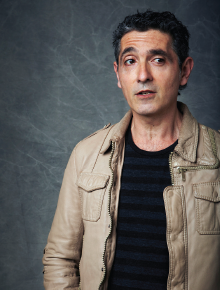When the late psychiatrist John Fryer, M.D., appeared at the 1972 APA Annual Meeting in Dallas in a mask and wig as “Dr. Henry Anonymous” to announce his homosexuality to colleagues, he created an iconic image in the history of APA and of gay people everywhere.
Dramatizing the closeted lives of gay people at a time when APA’s diagnostic manual still listed homosexuality as a mental disorder, the image in many ways became larger than the man himself. Fryer’s appearance at the meeting sparked a movement within APA that would result in APA trustees’ removing homosexuality from DSM, and it is regarded as a landmark in the wider movement for gay rights.
But who was John Fryer the man?
That’s what playwright Ain Gordon set out to explore in “The 217 Boxes of Dr. Henry Anonymous,” a 70-minute play that is being staged in New York from May 3 to May 11, including the dates of APA’s Annual Meeting in New York (see sidebar).
In 2014 the Pew Center for the Arts and Heritage and the Pennsylvania Historical Society, located in Philadelphia, funded Gordon to spend two years at the historical society as an “embedded artist.” His charge under the grant was to “look for personal battles for liberty.”
As it happens, the historical society is where John Fryer’s personal archival records are stored in boxes—217 of them to be exact. Gordon knew nothing at all about Fryer when he arrived, but in those boxes he found the source of his next inspiration and a life that he could unpack.
“It was entirely by accident that I happened upon the extraordinary photograph of Fryer in the disguise and tuxedo seated at the panel [at the APA meeting in 1972],” Gordon told Psychiatric News. “When I googled the episode, I learned that his papers were there in the historical society. I walked up to the desk, asked if I could see them, and was told ‘Yes.’ And that’s how I began to plunder the 217 boxes.”
Fryer’s “masked” history was a natural for Gordon, a past Guggenheim Fellow and three-time Obie (Off-Broadway theater) Award winner. “Much of my work as a playwright has been about the ways in which mainstream history edits out a lot of people and stories that don’t fit into or help promote the accepted narrative,” Gordon said. “Inside those edited-out pieces of history is where I find my inspiration.”
The boxes of Fryer’s papers contained all manner of paraphernalia—charge receipts, airline ticket stubs—as well as letters and correspondence with friends, acquaintances, and colleagues. (The boxes also contained some patient records, which remain sealed and which Gordon was unable to see.)
The portrait of the man who emerged was larger (literally, he was 6 feet 4 inches tall) and more human than the figure in the photograph wearing the mask could portray. As time rolled on, Fryer’s masked appearance as Dr. Anonymous in 1972 began to dominate much of the archival correspondence. “It occurred to me as my image of Fryer changed from box to box, that in a way the mask had become more famous than the man,” Gordon said. “That seemed to me to be a metaphor for much of gay history.”
In “The 217 Boxes of Dr. Henry Anonymous,” Gordon draws a portrait of Fryer through the personification of three characters who were prominent figures in the archives: Alfred Gross, a social activist with whom Fryer collaborated to help gay men who had been arrested in bars or elsewhere for homosexual conduct; Fryer’s secretary, who elaborates in the play on Fryer’s therapy with men who were ill with HIV/AIDS in the 1980s; and Fryer’s father.
The latter had never acknowledged Fryer’s sexuality in his lifetime, but in “The 217 Boxes of Dr. Henry Anonymous,” it is the father who reads aloud the speech Fryer delivered to psychiatrists in 1972.
The play is being produced by Equality Forum, a national and international LGBT civil rights organization. “The play will allow a wider audience to know the story of John Fryer and can shed light on the prejudice that was endemic in that era,” said Equality Forum Executive Director Malcolm Lazin in an interview. “People should remember that in 1972 in most states you could not be licensed as a psychiatrist if you were gay.
“It’s a remarkable work,” Lazin said of the play. “Sadly, few people know the story of John Fryer, though I believe he is among the top five people who have most dramatically impacted LGBT people. We are grateful to collaborate with APA on the production of this play, on the 45th anniversary of APA removing homosexuality from DSM in 1973.” ■


